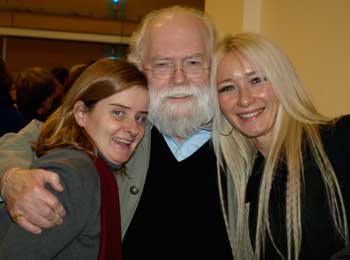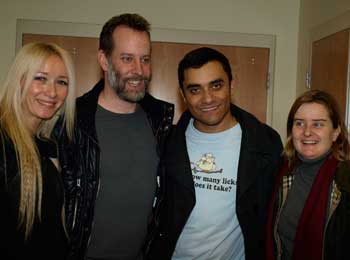A Conversation with
the Adaptor
Dramaturg Robyn Quick speaks with playwright Kate Moira Ryan about her adaptation of Tanya Tanya.
Kate Moira Ryan's recent projects include The Beebo Brinker Chronicles written with Linda S. Chapman ran to sold out houses off-Broadway and received the 2008 GLAAD Media Award. Questions for a Jewish Mother, written with and for Judy Gold, ran eight months off Broadway, received the 2007 GLAAD Media Award. Cavedweller, based on Dorothy Allison’s bestselling novel was produced by New York Theater Workshop. She has received numerous fellowships, most recently the Sundance Playwriting Fellowship, the Alfred E. Sloan Fellowship, and four fellowships from Center for International Theatre Development to Russia.
Tanya Tanya was commissioned for the Russian Season at the Towson University Department of Theatre Arts, developed with the Center for International Theatre Development.
RQ: What drew you to Mukhina’s work in general and this play in particular?
KMR: I really did not know anything about Olga Mukhina’s play or her work. I asked to do an adaptation of a Russian woman playwright and picked this one without knowing much about it. I felt it was important as a woman playwright to bring her work here. I was surprised when I first read John’s translation as it was unlike any of my work. I was at Wyoming for a Sundance Playwriting Fellowship and every night at dinner I would say, “I don’t know how I am going to make this work.” So I went on long walks and slowly it came to me-solidify the structure, let Olga’s language come out and make it accessible to American audiences. Every day I would work 3-4 hours a day and just let the play speak to me.
RQ: Your version of this script is called an adaptation. How do you consider an adaptation different from a translation and how did your notion of adaptation guide your approach to your work on Tanya Tanya?
KMR: I originally worked off of John Freedman’s literal translation of Tanya Tanya and then I hired a young Russian student from the University of Chicago to translate it word for word to make sure I was completely clear on the text. Then I adapted it which means I changed the language, cut parts which could not translate to an American audience and lastly, I tried to make Olga’s work not only as clear as possible, but also as poetic as possible. Just about every line from the literal translation has been changed. Olga is a poet. She’s a playwright and a poet and I wanted her wonderful language to come through.
RQ: What are your goals in adapting the play?
KMR: My goals were simple, but in some ways quite lofty. I wanted to make this play accessible to American audiences. As a nation are still very much entrenched in a linear framework i.e. a beginning, middle and end story line. This play is more ethereal than that. So I attempted to make it as understandable as I could for an American audience without destroying its own structure and beauty.
RQ: There were two staged readings of your script prior to our production – one at Towson in May and one at the New York Theatre Workshop in October. What kind of information does a staged reading give a playwright and how did this particular script change as a result of what you perceived in those readings?
KMR: Stage readings are great resources for me as a playwright. In the first one, I made cuts and tweaks. In the second one, I actually had Yury with me for two days. We spoke about the play. I listened to his notes, I listened to the actors questions and made changes. I said to Yury, “I am here for you. You tell me what I need, how I can help you and I will figure out how to do it.” My job is the script. Yury’s is to make it come alive. I rarely if ever interfere with a director’s job, but I am always available to help a director when questions come up in rehearsal.
RQ: Where there any moments in the play that created challenges for you because of very specific Russian cultural references? How did you attempt to craft those moments in a way that would speak to audiences in the U.S.?
KMR: Yes, there are very specific references to Russian poets especially when Ivanov starts quoting from Mayakovsky. I said to Yury - most Americans do not know of Mayakovsky’s work-so we’ll have to reference it somehow. And I did a very simple reference like, “Why are you quoting Mayakovsky?” Russians know their poets. They are proud of their poets. Every city has a Pushkin Square. In America, I guess the closest poets would be Whitman or Frost, but I don’t find many Americans quoting poetry. In Russia, poets have an almost god like stature, so it’s refreshing for me to enter into this world, but also challenging to try and convey how Russians feel about their poets and writers. How they feel about their language. I’ve studied Russian on and off for a couple years and I love to speak it. I love to listen to it. Some people think Russians are abrupt when they speak English, but the Russian language is very formal and very, very polite. I love going to Russia. I think I’ve explored almost every inch of Moscow and St. Petersburg. I just wish I could get more Americans to visit and experience it the way I do. I am so grateful for the CITD and the Trust for bringing me and for opening my world the way it has. I wish I was fluent enough to read Chekhov or Turgenev or Ahkmatova or Mukhina in Russia.
I once heard an old recording of Vladimir Nabokov on BBC radio. They asked him if he mourned his loss of estates and wealth (he had fled after the revolution). He answered that the only thing he mourned was writing in his mother language of Russian. And the irony is that he became one of the greatest English language writers of the 20th century.

From left translator Kate Moira Ryan, CITD director Philip Arnoult and playwright Olga Mukhina after a performance of Tanya Tanya. December 2009. Photo: Robyn Quick

From left, Olga Mukhina, actors Joseph Ritsch and David Gregory, and Kate Moira Ryan. December 2009. Photo: Robyn Quick



